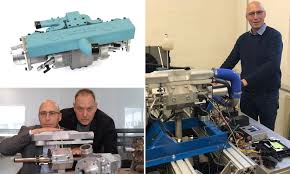
Breaking News
Importing Poverty into America: Devolving Our Nation into Stupid
 Grand Theft World Podcast 273 | Goys 'R U.S. with Guest Rob Dew
Grand Theft World Podcast 273 | Goys 'R U.S. with Guest Rob Dew
 Anchorage was the Receipt: Europe is Paying the Price… and Knows it.
Anchorage was the Receipt: Europe is Paying the Price… and Knows it.
 The Slow Epstein Earthquake: The Rupture Between the People and the Elites
The Slow Epstein Earthquake: The Rupture Between the People and the Elites
Top Tech News
 Drone-launching underwater drone hitches a ride on ship and sub hulls
Drone-launching underwater drone hitches a ride on ship and sub hulls
 Humanoid Robots Get "Brains" As Dual-Use Fears Mount
Humanoid Robots Get "Brains" As Dual-Use Fears Mount
 SpaceX Authorized to Increase High Speed Internet Download Speeds 5X Through 2026
SpaceX Authorized to Increase High Speed Internet Download Speeds 5X Through 2026
 Space AI is the Key to the Technological Singularity
Space AI is the Key to the Technological Singularity
 Velocitor X-1 eVTOL could be beating the traffic in just a year
Velocitor X-1 eVTOL could be beating the traffic in just a year
 Starlink smasher? China claims world's best high-powered microwave weapon
Starlink smasher? China claims world's best high-powered microwave weapon
 Wood scraps turn 'useless' desert sand into concrete
Wood scraps turn 'useless' desert sand into concrete
 Let's Do a Detailed Review of Zorin -- Is This Good for Ex-Windows Users?
Let's Do a Detailed Review of Zorin -- Is This Good for Ex-Windows Users?
 The World's First Sodium-Ion Battery EV Is A Winter Range Monster
The World's First Sodium-Ion Battery EV Is A Winter Range Monster
 China's CATL 5C Battery Breakthrough will Make Most Combustion Engine Vehicles OBSOLETE
China's CATL 5C Battery Breakthrough will Make Most Combustion Engine Vehicles OBSOLETE
Superlight Micro-Engine That Weighs Just 22lbs and Is the Size Of A BACKPACK ...

A hyper-efficient and super-light one-piston engine smaller than a backpack could render modern hybrids obsolete.
Shaul Yaakoby, 53, is the engineer from Tel Aviv, Israel, that developed the engine and claims it is capable of churning out enough horsepower to run a small hatchback for 750 miles (1,200 km) without refuelling.
The engine, manufactured by firm Aquarius Engine, is made of a only a dozen moving components.
MailOnline has obtained data from the firm which reveals the car engine to be 10 per cent more efficient than the average vehicle.
It is now undergoing field tests and the company expects its generator it to be commercially available by the end of 2020 and in cars by 2022.
Mr Yaakoby said its simplicity enables the lightweight design to be so efficient.
'What makes the Aquarius Engine so revolutionary is its simple design, we took the traditional combustion engine that hasn't really been changed in 150-years and we stripped it down to the bare necessities,' he said.
'This means a 10kg [22lbs] engine made up of 20 parts that is more efficient than a 200kg [220lbs] engine made of 200 parts.
'For over a century cars have been carrying around a ton of dead weight that has costed us power and efficiency.



